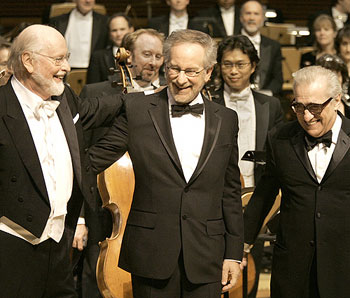

  |
|
|
||||||||||||||||||||||
|
FMS FEATURE... March 8, 2007 Williams Raises Herrmann's Kane at Disney Hall Spielberg and Scorsese help celebrate the music of two incomparable film composers by Jon Burlingame  Photograph by Gary Friedman, Los Angeles Times The concert was unusual for a number of reasons, not least of which was the presence of directors Martin Scorsese and Steven Spielberg, who offered cogent commentary on the creative use of music in films. They shared their personal experiences working with Herrmann (who scored Scorsese's Taxi Driver) and Williams (whose 34-year relationship with Spielberg has encompassed 22 feature films). The program was identical to a New York Philharmonic program that Williams conducted last year, also with Scorsese introducing the Herrmann half and Spielberg introducing the Williams half. As with the Avery Fisher Hall concert, both halves featured film clips. The two-and-a-half-hour program began with the "Death Hunt" cue from On Dangerous Ground (1951), in Williams' words a "wild blast of music" that featured no less than eight French horns. Williams took it at a slower tempo than Philharmonic music director Esa-Pekka Salonen during his October 2003 film-music concert to inaugurate Disney Hall. The first of the evening's standing ovations greeted recent Oscar recipient Scorsese, who spoke of the "timeless quality" and "haunting, melancholy edge" of many Herrmann scores and regaled the crowd with anecdotes about working with the notoriously gruff composer – who, when asked by Scorsese to consider scoring Taxi Driver, initially dismissed the notion with the memorable line, "I don't do films about cabbies." The bright, very live sound of the hall was perfect for Herrmann's music, providing definition and clarity to the instrumental detail throughout. The opening movement of Herrmann's Welles Raises Kane suite – an expansion of the Inquirer music from Citizen Kane (1941) – and the evocative pastoral music of "The Ballad of Springfield Mountain" from The Devil and Daniel Webster (also 1941, Herrmann's sole Oscar winner) benefited from the superb acoustics. The sole piece on the program that was not from a film, "Gallop: The Whip" from Herrmann's 1935 Currier & Ives Suite, was a curiosity, followed by two of Herrmann's most famous scores for director Alfred Hitchcock: the "Scene d'Amour" from Vertigo (1958) and the prelude and murder music from Psycho (1960). Scorsese called Vertigo his favorite score for a Hitchcock picture, helping to convey "the aching, tragic sadness of the film" and reminded the audience that those "relentless, driving strings" in Psycho made it "one of the most influential movie scores ever created." Dan Higgins played the alto saxophone solos in the alternately dramatic and romantic eight-minute suite from Taxi Driver (1976). Perhaps the sole misstep in the entire concert were the two film montages created to accompany Williams' performance of music from Psycho and the prelude from North by Northwest (1959). Both scores were beautifully played, but the images were distracting and confusing because they were not from the specific film sequences for which the music was written, which would have been far more effective. The North by Northwest montage was actually drawn from multiple Hitchcock films. Nevertheless, the audience gave the work a standing ovation. Williams opened the second half of the program with his concert arrangement of the theme from Jaws (1975), which served to introduce Spielberg to yet another standing ovation. He talked about working with Williams on Close Encounters of the Third Kind (1977) and about his concept that the aliens would "communicate through light and color and musical tones." He admitted that, after all the production problems on Jaws, Williams "saved my picture" with his music. Williams' 10-minute suite from Close Encounters was beautifully realized, as was his classically styled "Out to Sea / Shark Cage Fugue" from Jaws. The audience seemed to relish the next segment as Spielberg talked them through a sequence featuring River Phoenix as Young Indy in Indiana Jones and the Last Crusade (1989) – at first showing only dialogue and sound effects as he explained how the music would strike the right moods, indicating where Williams' music would need to "hit" specific actions on-screen. Williams then performed the lively piece with the orchestra, carefully watching a monitor that ran the clip with "streamers" to indicate precisely where in the sequence the orchestra needed to play at any given moment. This, Spielberg said, demonstrated how "John saves my butt" on every film. Violinist Bing Wang flawlessly played the solo part in Williams' theme from Schindler's List (1993), which Spielberg called "the most profoundly emotional" experience he had ever had in filmmaking. The finale – and high point – of the evening was the Philharmonic's performance of the final 14 minutes of E.T., the Extra-Terrestrial (1982), again with Williams conducting to both the score on the podium and a monitor running a streamered print just in front of him. The film featured dialogue and sound effects while the Philharmonic enthusiastically played Williams' thrilling, emotional score. When Elliott and friends became airborne on their bicycles, the audience burst into applause. And when the Philharmonic and film finished together in perfect synch, there were cheers throughout the house. Spielberg and Williams exited the stage, arm in arm, to another standing ovation. Williams' three encores were also from Spielberg films. First was The Sugarland Express (1974), their first film together, with a flute replacing the harmonica solos of the original. Next was "Flight to Neverland" from Hook (1991); and finally the well-known march from Raiders of the Lost Ark (1981) which, because of the hall's spectacular acoustics, managed to sound fresh despite its familiarity. Williams, Spielberg and Scorsese all returned to the stage to accept yet another standing ovation from the sold-out house. ©2007 Jon Burlingame |
Search
Past Features
Feature Archives
|